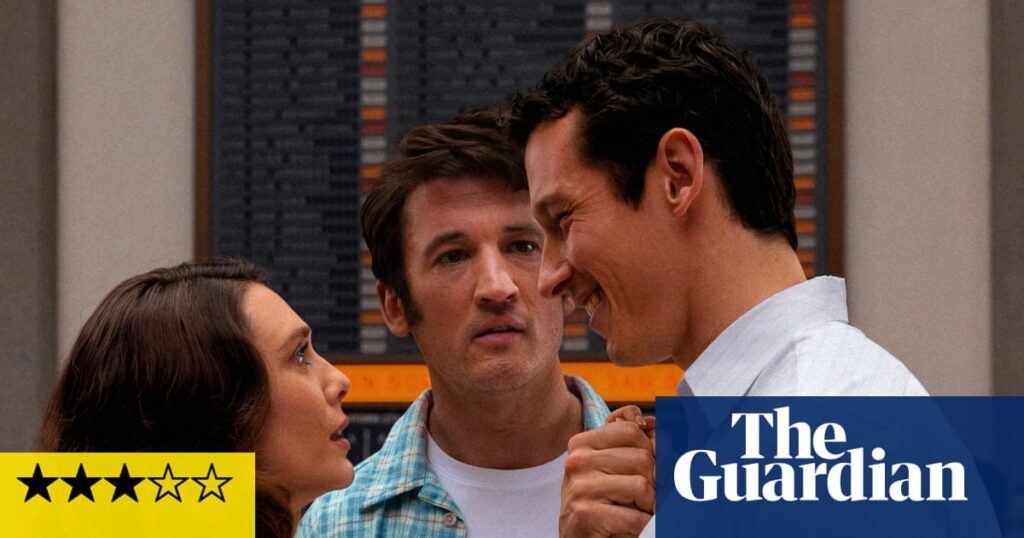As we return to the 1990s, with Scream, Clueless, Buffy, Practical Magic, Happy Gilmore and My Best Friend’s Wedding having either returned or set for it, there’s also a broader sense of nostalgia that’s seeing the resurrection of certain genres. Already at this year’s Toronto film festival, Aziz Ansari admirably tried, and I would say sadly failed, to recall the spirit of the high-concept star-led comedy with fantastical elements in Good Fortune. There’s a far more convincing attempt from the Irish writer-director David Freyne with Eternity, an ambitious afterlife romance that could more neatly play alongside films of the era like Heart and Souls, What Dreams May Come and Ghost.
It’s not just the thought-through ingenuity of the set-up but also the gloss and grandness of the film-making, an A24 production that feels like it should have the Touchstone Pictures logo at the start. It’s the surprising next step for Freyne whose endearing queer comedy Dating Amber got a little buried in the hellish summer of 2020. That film – about queer high schoolers faking a relationship to kill suspicion – was small and semi-autobiographical for Freyne, and for his follow-up he’s gone from rooted in truth to floating in fantasy.
In the witty, well-constructed world of Eternity, death is not the end. Once your time in the real world is over, you arrive via train to a 1960s-looking convention centre, at the exact age when you were at your happiest. You then meet your AC (Afterlife Consultant) who will help you decide where to go next. Maybe you want to spend your afterlife on the beach (hello Beach World) or maybe you’re a woman who has had just about enough of men (Men Free World is amusingly full up) or perhaps you’re a gay man who wants to enjoy the indulgences of the 80s without the Aids crisis (that’ll be Studio 54 World). It’s a flurry of salespeople all trying to secure your place, a decision that can’t be overturned once you’re there.
Larry just choked on a pretzel and died in front of his family, an abrupt end to a long life and a mostly happy marriage. He wakes up as his younger self (Miles Teller) and is paired with Anna (Da’Vine Joy Randolph) who explains his situation and tries to match him with the ideal afterlife. But Larry wants to wait for his wife Joan, whose cancer diagnosis suggests the wait won’t be that long. When she does arrive (returning to her youth, played by Elizabeth Olsen), there’s a slight snag. Her first husband Luke (Callum Turner) died in the war decades prior and he’s also been waiting. With the help of her AC Ryan (John Early), Joan has to decide who she wants to spend eternity with.
It’s a fun, nifty set-up, the outline of a classic love triangle given a smart and thought-provoking shake-up, stakes raised as high as they can possibly get. Joan must weigh the potential of what was barely explored and cruelly taken from her against the security of what she already knows, just maybe a little too well. The one she grieved for versus the one who helped her grieve, the memory of young love versus the reality of long-term marriage, the one who remembers her when she was at her best versus the one who knew her when she was at her worst. It’s a big film, of big ideas and big, audience-swaying emotional swings, and Freyne mostly aces such a mammoth expansion of canvas. He has a light touch that keeps his film dancing with both speed and grace, influenced not just by the sleek multiplex fare of the 90s but also the transporting high-concept fantasies of the 40s that inspired them, films like A Matter of Life and Death and It’s a Wonderful Life. It’s also refreshing to see a queer director bring a queer sensibility to a mainstream, straight-led romance. It allows for numerous snippets of worlds designed around gay utopias (one is literally called Queer World), a lesbian revelation from Joan’s recently deceased friend and for one of the male leads to make brief, casual reference to his experiences with men in the past.
The film lands Teller and Olsen with a relatively complex acting challenge, embodying their characters’ physical younger selves and the speech patterns of that time but with the experience and, often crankiness, of age. They both manage incredibly well without dipping into pastiche and Teller is especially charming in ways we haven’t seen from him in a long time, if ever really before. Turner does handsome matinee idol well (he’s likened to Montgomery Clift in the film), Early’s trademark delivery adds a fun and contemporary comic zip to more trad territory and the film gives a wonderful Randolph her most deserving, if still too small, post-Oscar role yet, allowed out of the punishing thanklessness of action slop like Bride Hard and Shadow Force. In the last act she’s a little underserved, though, Freyne leading her to a much-teased yet weirdly ineffective big reveal, tears replaced with a shrug.
That scene is indicative of a last act that doesn’t quite reach the soaring emotional highs we expect or want, Freyne too focused on the cleverness of plot machinations to focus on making us really feel something. It’s where the film risks seeming more like an approximation than an original, as if we’ve decided to spend eternity in 90s Romantic Fantasy World, allowing us to admire what Freyne is doing rather then respond emotionally to it. I admired a great deal here, though, especially Freyne’s attempt to transport us back to a cinema landscape before it was dulled down by streaming. That’s an afterlife I would happily choose.
-
Eternity is screening at the Toronto film festival and will be released on 14 November in the US, in Australia on 4 December and in the UK on 5 December

